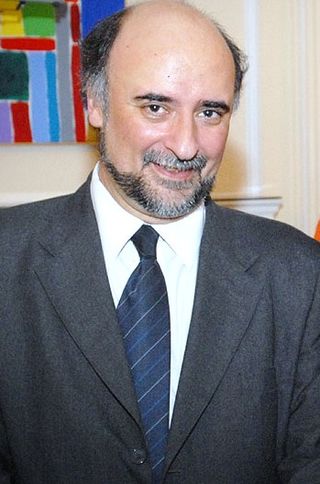
The politics of Uruguay abide by a presidential representative democratic republic, under which the president of Uruguay is both the head of state and the head of government, as well as a multiform party system. The president exercises executive power and legislative power and is vested in the two chambers of the General Assembly of Uruguay. The Judiciary is independent from the executive and legislature.

The Colorado Party is a liberal political party in Uruguay.

The Socialist Party of Uruguay is a socialist political party in Uruguay. Founded in 1910, it is part of the Broad Front political coalition and the Progressive Alliance.

The Broad Front is a left-wing political coalition in Uruguay. In 2025 it will be the ruling party of Uruguay, having previously ruled from 2005 to 2020 and has produced three presidents: Tabaré Vázquez, José Mujica (2010–2015) and Yamandú Orsi. Since 1999, it has been the largest party in Uruguay's General Assembly.

The Chamber of Senators of Uruguay, or Senate, is the upper house of the General Assembly of Uruguay. It has 30 members, elected for a five-year term by proportional representation; the vice-president presides over the chamber's sessions.

The General Assembly of Uruguay is the bicameral legislature of the government of Uruguay, and consists of two chambers: the Chamber of Senators and the Chamber of Representatives. General Assembly has 130 voting members: 99 representatives and 30 senators, the Vice President of the Republic, who serves as President of the General Assembly, and the Senate has the right to vote. The legislature meets in the Legislative Palace in Montevideo. Both senators and representatives are chosen through proportional representation for five-year terms.

Feliciano Alberto Viera Borges was a Uruguayan political figure.

General elections were held in Uruguay on 31 October 1999, alongside a double referendum, with a second round of the presidential election on 28 November. The elections were the first in Uruguay since World War I that were not dominated by the Colorado Party and the National Party. The Broad Front had begun gaining popularity in 1994, and had become a key player in Uruguayan politics by 1999.

The Constitution of Uruguay is the supreme law of Uruguay. Its first version was written in 1830 and its last amendment was made in 2004.

General elections were held in Uruguay on 25 October 2009 alongside a two-part referendum. As no candidate for president received more than 50% of the vote, a second round was held on 29 November between the top two candidates, José Mujica of the ruling Broad Front and former president Luis Alberto Lacalle of the National Party (29%). Mujica won the run-off with 55% of the vote.

General elections were held in Uruguay on 26 October 2014, alongside a constitutional referendum. As no presidential candidate received an absolute majority in the first round of voting, a runoff took place on 30 November. Primary elections to determine each party's presidential candidate had been held on 1 June.

Parliamentary elections were held in Uruguay on 14 January 1917. The Colorado Party won a majority of seats in both the Chamber of Representatives and Senate.

General elections were held in Uruguay on 28 November 1926, electing the president, three members of the National Council of Administration and six of the nineteen members of the Senate.

General elections were held in Uruguay on 25 November 1928, electing all members of the Chamber of Representatives, three members of the National Council of Administration and seven of the nineteen members of the Senate.

General elections were held in Uruguay on 30 November 1930, electing the president, three members of the National Council of Administration and six of the nineteen members of the Senate. Although Luis Alberto de Herrera of the National Party received the most individual votes for president, the Colorado Party received more votes overall and its lead candidate Gabriel Terra was elected president. The Colorado Party won two of the three seats in the National Council of Administration, while the National Party won four of the six seats in the Senate.

Parliamentary elections were held in Uruguay on 19 April 1934, alongside a constitutional referendum. For the first time, the Senate was directly elected by voters. The result was a victory for the Colorado Party, which won a majority of seats in the Chamber of Representatives.

General elections were held in Uruguay on 28 March 1938. The result was a victory for the Colorado Party, which won a majority of seats in the Chamber of Representatives and received the most votes in the presidential election, in which the Alfredo Baldomir faction emerged as the largest. Baldomir subsequently became President on 19 June.

Pablo Andrés Mieres Gómez is a Uruguayan politician of the Independent Party (PI), who served as Minister of Labour and Social Welfare from 2020 to 2024 under President Luis Lacalle Pou. He previously served as National Representative from 2000 to 2005 and as Senator of the Republic from 2015 to 2020.

General elections were held in Uruguay on Sunday, 27 October 2019 to elect the President and General Assembly. As no presidential candidate received a majority in the first round of voting, a runoff election took place on 24 November.

General elections were held in Paraguay on 22 April 2018. President Horacio Cartes and Vice-President Juan Afara of the Colorado Party were not eligible for re-election. The presidential elections were won by the Colorado Party's Mario Abdo Benítez, who defeated Efraín Alegre of the GANAR alliance. The Colorado Party also won the most seats in the Senate and Chamber of Deputies. The new President and Vice-President took office on 15 August 2018 and left office in August 2023.












